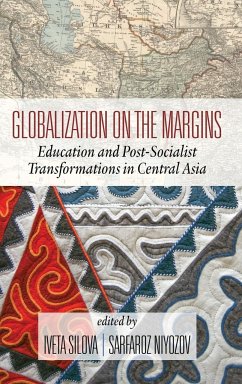
Globalization on the Margins
Education and Post-Socialist Transformations in Central Asia (2nd Edition) (HC)
Herausgeber: Silova, Iveta; Niyozov, Sarfaroz
Versandkostenfrei!
Versandfertig in 1-2 Wochen
126,99 €
inkl. MwSt.
Weitere Ausgaben:

PAYBACK Punkte
63 °P sammeln!
The second edition of Globalization on the Margins examines Central Asian education development since the Soviet Union's dissolution in 1991. It explores Soviet legacies, global reform pressures, and recent developments in Kazakhstan, Kyrgyzstan, Tajikistan, Turkmenistan, and Uzbekistan.














